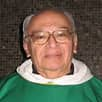At a wedding reception not so long ago the groom entered the hall with a weighted ball chained to his ankle. The stunt was meant to be funny. Statistics show, however, that many young adults these days are not kidding; they are negative toward the institution of marriage. In fact, the majority of family arrangements today do not include marriage.
Brad Wilcox of the National Marriage Project at University of Virginia sets out to counter those negative attitudes in Get Married: Why Americans Must Defy the Elites, Forge Strong Families and Save Civilization (Broadside Books, 2024). Marriage is good for a couple’s finances, good for their health, for their sexual fulfillment, for a flourishing society and particularly for children. Nothing else, Wilcox convincingly argues, is a better predictor of a child’s overall health and eventual upward mobility than a married two-parent family. “Not income inequality. Not race. Not school quality.”
Wilcox furnishes credible examples of both conservatives and liberals who disparage marriage. But his tone, as contained in the book’s subtitle (defy the elites) implies that a particular ideology is harming an otherwise pro-marriage group of people. Yet, foregoing marriage is common among both conservatives and liberals.
Keep in mind that corresponding or parallel factors are not the same as causal variables. That is, marriage is associated with higher income over time. But that does not mean that higher income necessarily makes for a good marriage or that a stable marriage automatically leads to a high-paying job.
Melissa Kearney, like Wilcox, likewise shows the advantages of marriage in her widely- reviewed The Two-Parent Privilege (University of Chicago Press, 2023). There’s a strong overlay between a college degree and a marriage license. Those lacking a college degree constitute the majority of family arrangements outside of marriage. She then shows the overlay between the education/marriage combo and economic mobility. Those with a college degree soon enough financially outpace those who do not complete college and those with a degree are more likely to be married than those without.
The phrase college degree is deliberate. Today, about 40% of 18-24 year-olds enroll in college. The payoff, however, comes only to those who graduate. Of all those who enter college, only about 40% complete their degree, even after six years in school. Those who drop out can be in worse shape than if they hadn’t enrolled at all because of student debt and missed years of earnings.
A further thought must quickly be added to the college degree comment. A household in which the breadwinner(s) have a post-high school certification in a career area can financially succeed. Burning Glass Institute of suburban Philadelphia, for example, names 73 non-degree careers that can stabilize a family. Education in those areas covers the specifics of the intended job plus needed computer skills and good communication and teamwork.
Back to Kearney: It is wrong to put a moral spin on the marriage decision. The decisions and their outcomes are not related to the goodness of a person, she writes. For example as Kearney writes, “It is not helpful to blame or shame women who are faced with the difficult choice between parenting alone or living with a partner who is an economic or emotional drain.” Life is more complicated than a simple formula like Get Married and You Will Thrive.
Again, the three factors—marriage, college degree and economic mobility--are not related in direct cause and effect. They are strongly associated with one another. And that association is worth serious reflection.
Droel edits INITIATIVES (PO Box 291102, Chicago, IL 60629), a printed newsletter on faith and work.





